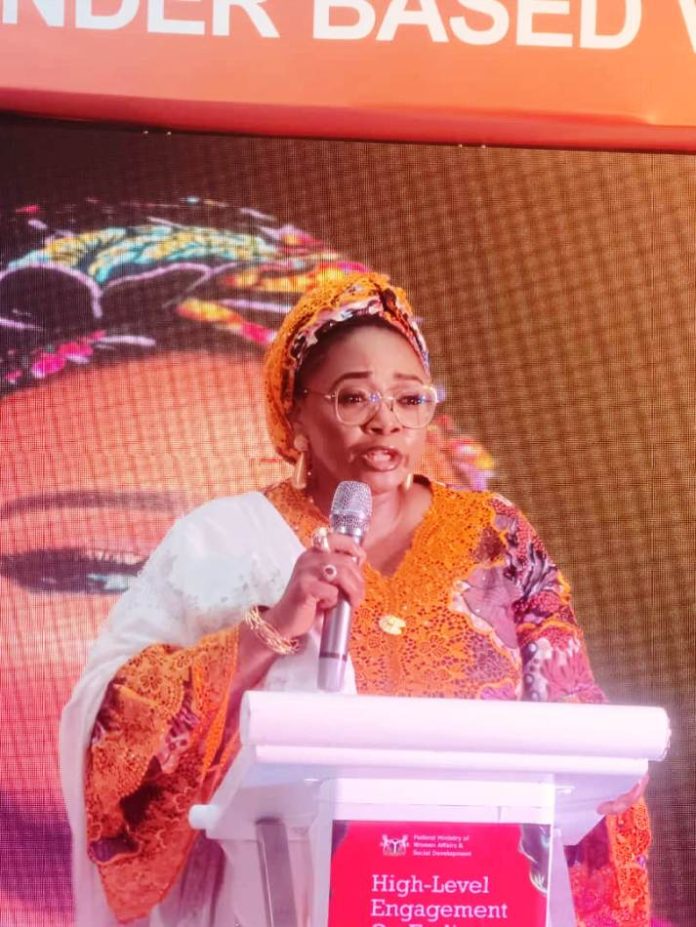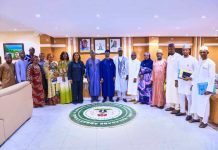
The Federal Ministry of Women Affairs, in partnership with Women for Women International and the United Nations Development Programme (UNDP), has reaffirmed federal government’s renewed commitment to eradicating all forms of Gender-Based Violence (GBV), including the rising threat of digital violence against women and girls.
This declaration was made during a high-level engagement held on Monday, November 24, 2025, at the Envoy Hotel, Abuja, marking the national commencement of the global 16 Days of Activism Against Gender-Based Violence under the theme: “UNiTE! End Digital Violence Against All Women and Girls.”
Honourable Minister of Women Affairs and Social Development, Hajiya Imaan Sulaiman-Ibrahim, FSI, in her keynote address, emphasized that Nigeria is at a critical point in its national struggle against violence targeting women and girls—one where coordinated, strategic action is urgently needed. “Gender-based violence remains one of the most pervasive human rights violations in Nigeria,” the Minister stressed.
According to her “We must not allow this moment to be defined by statistics, but by the decisive actions we take now to protect women and girls wherever they live—online or offline.”
The Minister described the current landscape as deeply troubling, citing recent mass abductions of women and girls, conflict-related violence, and persistent impunity, which collectively undermine national stability and women’s freedom to live and work without fear.
According to NDHS 2018, 28% of Nigerian women aged 15–49 have experienced physical violence, while 40% have suffered emotional violence, and 7% have been subjected to sexual violence. An alarming 149% increase in reported GBV cases during COVID-19 remains a major concern, yet the national conviction rate remains below 5%.
However, recent data from NDHS 2024 offers signs of progress, showing slight declines in child marriage (42%) and FGM prevalence (18%). The Minister reiterated the government’s commitment to scaling up positive gains through the Ministry’s 9-Pillar Renewed Hope Social Impact Intervention Programme (RH-SIIP-774).
She announced ongoing investments in survivor-centered services, digital empowerment programmes, specialised gender courts, safe spaces, and the development of a national GBV Emergency Response Fund.
“Survivors remain at the heart of Nigeria’s response,” Hajiya Sulaiman-Ibrahim said, adding that their courage and resilience shape our policies and drive our determination to deliver justice, dignity, and protection for all women and girls.
The Minister concluded with a compelling national vision, saying, Nigeria’s goal is ” to build a nation where every woman and girl is safe, empowered, and free to reach her full potential.”
Earlier in a welcome address, the Permanent Secretary, Dr. Maryam Ismaila Keshinro, emphasized the Ministry’s resolve to strengthen coordination, deepen evidence-driven dialogues, and ensure that national commitments translate into tangible results.
“Only through collaboration, constructive engagement, and shared ownership can we achieve lasting impact,” she affirmed.
According to her, the event marks another critical step toward building a safer, more inclusive, and more equitable Nigeria.”
In her opening remarks, Nabila Aguele, Board Member of Women for Women International and Chief Executive, Nigeria, Malala Fund, highlighted the devastating prevalence of GBV globally and in Nigeria.
“One in three women worldwide will experience violence in their lifetime—and Nigeria accounts for 10% of the world’s survivors,” she noted.
According to her, “GBV is not a tragic inevitability. It is a deliberate tactic used to terrorize and silence women. But through community-driven solutions and sustained political will, we can bring an end to this crisis.”
Aguele emphasized the link between education and reduced GBV, reinforcing Malala Fund’s belief that every girl should complete secondary school. She also celebrated the presence of Ms. Thelma Ekiyor, newly appointed International CEO of Women for Women, whose leadership reinforces the organization’s global fight against GBV.
She concluded with a testimony from WfWI trainer, Tami Wophill, who said, “Once women understand their rights, they become empowered to speak out—not just for themselves, but for others. This collective awareness is already reducing violence in communities.”
Representing the UNDP, Ms. Elsie Attafuah, Resident Representative, highlighted the rapid expansion of Nigeria’s digital economy and the parallel rise of technology-facilitated violence—including cyberstalking, online harassment, and non-consensual sharing of images.
“Nigeria’s digital future cannot coexist with digital harm,” she warned. We must strengthen digital safety systems, modernize legal frameworks, and ensure women and girls can innovate and participate online without fear”.
Signed
Ahmed Lawan Danbazau mnipr
Head, Press & Public Relations Department





